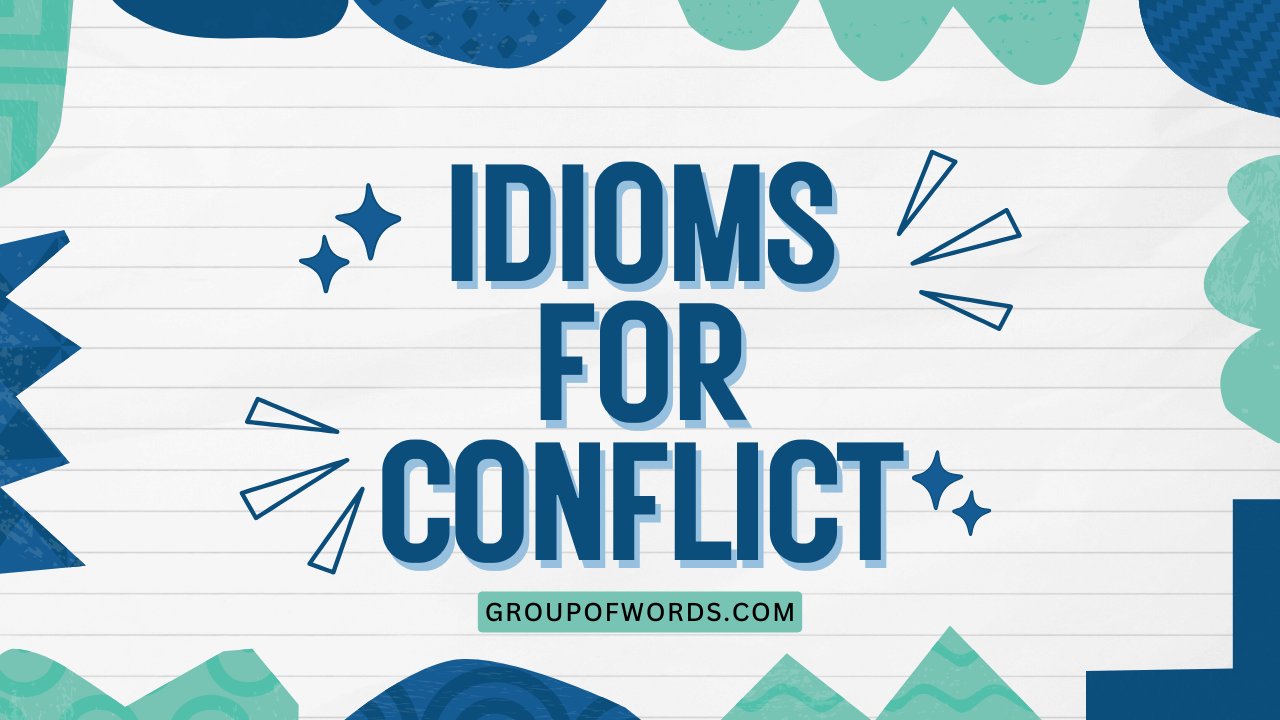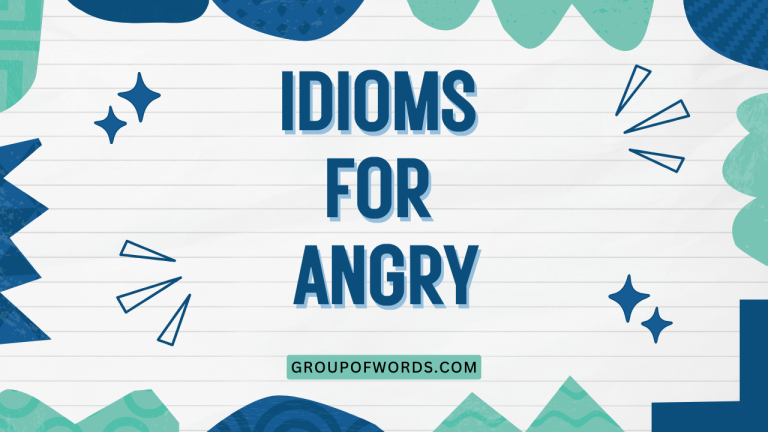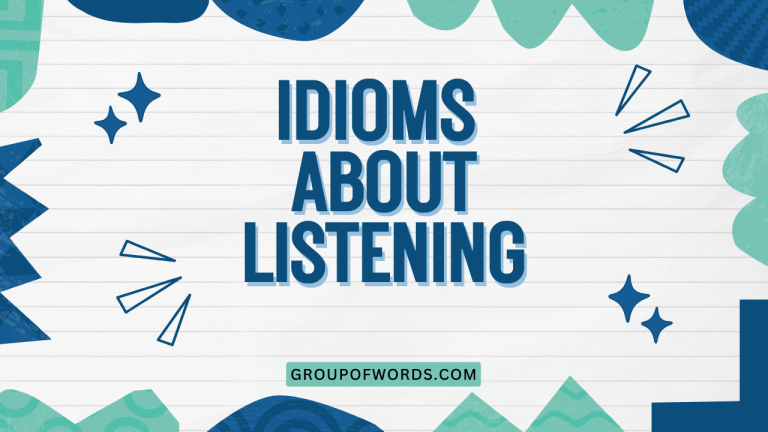Idioms for Conflict: Mastering English Expressions of Discord
Understanding idioms is crucial for mastering English, especially when discussing complex topics like conflict. Idioms add color and nuance to our language, allowing us to express subtle shades of meaning that literal language often misses.
This article provides a comprehensive guide to idioms related to conflict, exploring their meanings, usage, and providing numerous examples. Whether you’re an English language learner or a native speaker aiming to enhance your vocabulary, this guide will equip you with the tools to navigate discussions about conflict with greater confidence and precision.
This article is designed for English language learners of all levels, from intermediate to advanced. Native speakers looking to refine their understanding of idiomatic expressions will also find valuable insights here.
By studying these idioms, you’ll improve your comprehension of spoken and written English, and enhance your ability to express yourself more effectively when discussing disagreements, arguments, and other forms of conflict.
Table of Contents
- Introduction
- Definition of Idioms for Conflict
- Structural Breakdown of Conflict Idioms
- Types and Categories of Conflict Idioms
- Examples of Idioms for Conflict
- Usage Rules for Conflict Idioms
- Common Mistakes with Conflict Idioms
- Practice Exercises
- Advanced Topics in Conflict Idioms
- Frequently Asked Questions
- Conclusion
Definition of Idioms for Conflict
An idiom is a phrase or expression whose meaning cannot be understood from the literal meanings of its individual words. Idioms for conflict are expressions used to describe disagreements, arguments, disputes, and other situations involving opposition or struggle.
These idioms often employ figurative language, metaphors, and similes to convey the intensity, nature, and outcome of a conflict.
Idioms related to conflict can be classified based on their function. Some describe the initiation of a conflict, while others depict its escalation, resolution, or avoidance.
Understanding these classifications helps in selecting the most appropriate idiom to convey the intended meaning in a specific context. The context in which an idiom is used is vital, as the same idiom can have different connotations depending on the situation and the speaker’s intention.
Conflict idioms add depth and color to discussions about disagreements. They allow speakers and writers to convey not just the fact of a conflict, but also its emotional tone, intensity, and potential consequences.
Using idioms effectively demonstrates a strong command of the English language and enhances communication by making it more engaging and relatable.
Structural Breakdown of Conflict Idioms
Conflict idioms, like all idioms, exhibit a variety of structural patterns. They can range from simple two-word phrases to more complex sentences.
Understanding these structures is key to recognizing and using idioms correctly.
Many conflict idioms are based on metaphors, drawing parallels between conflict and other concepts like war, sports, or natural phenomena. For example, “to bury the hatchet” uses the image of burying a weapon to symbolize the end of a conflict.
Similarly, “to be at loggerheads” uses the image of opposing tools to represent disagreement.
Some idioms use verbs in specific tenses or forms to convey nuances of meaning. For instance, the use of the continuous tense in “to be locking horns” suggests an ongoing and active conflict.
The use of prepositions is also crucial in many idioms, as they contribute to the overall meaning. For example, “to fall out with someone” has a different meaning than “to fall for someone,” highlighting the importance of prepositional usage.
Types and Categories of Conflict Idioms
Conflict idioms can be categorized based on various aspects of conflict, such as its intensity, nature, and outcome. Here are some key categories:
Idioms Describing the Start of a Conflict
These idioms describe how a conflict begins, often focusing on the initial disagreement or trigger.
Idioms Describing the Escalation of a Conflict
These idioms illustrate how a conflict intensifies, becoming more heated or serious.
Idioms Describing the Resolution of a Conflict
These idioms depict how a conflict ends, whether through compromise, surrender, or reconciliation.
Idioms Describing Verbal Conflict
These idioms relate specifically to arguments and disagreements expressed through words.
Idioms Describing Avoidance of Conflict
These idioms describe attempts to prevent or sidestep conflict.
Examples of Idioms for Conflict
This section provides a comprehensive collection of idioms related to conflict, categorized for easier understanding. Each category includes definitions and example sentences to illustrate usage.
General Conflict Idioms
These idioms describe conflict in a general sense, without specifying the type or stage of the conflict.
The table below provides a variety of general conflict idioms with definitions and example sentences to illustrate their usage. These idioms can be used in many different contexts to describe general disagreements or disputes.
| Idiom | Definition | Example Sentence |
|---|---|---|
| At odds | In disagreement; conflicting. | The two companies are at odds over the terms of the contract. |
| At loggerheads | In a state of strong disagreement. | The board members are at loggerheads about the new marketing strategy. |
| Lock horns | To engage in a fight or argument. | The politicians locked horns over the proposed tax reforms. |
| Be a bone of contention | A subject or issue over which there is continuing disagreement. | The location of the new factory has become a bone of contention between the two towns. |
| Cross swords | To argue or fight with someone. | The lawyers crossed swords in the courtroom. |
| In the trenches | In the midst of a difficult struggle. | The sales team is in the trenches, working hard to meet the quarterly goals. |
| Go to war | To start a conflict. | The two tech giants are going to war over intellectual property rights. |
| Draw a line in the sand | To set a limit or boundary that one will not cross. | The manager drew a line in the sand, stating that no more late submissions would be accepted. |
| Fight tooth and nail | To fight with great effort and determination. | The small business is fighting tooth and nail to survive in the competitive market. |
| Come to blows | To engage in a physical fight. | The argument escalated so quickly that they nearly came to blows. |
| Battle lines are drawn | The opposing sides in a conflict are clearly defined. | With the new legislation proposed, battle lines are drawn between the parties. |
| At each other’s throats | In a state of intense conflict or argument. | The siblings have been at each other’s throats ever since they were kids. |
| A clash of wills | A conflict arising from strong, opposing desires. | The project failed due to a clash of wills between the project managers. |
| Leave a bad taste in one’s mouth | To leave someone with a negative feeling or memory. | The way the negotiation ended left a bad taste in my mouth. |
| On a collision course | Moving towards a conflict. | The two companies are on a collision course due to their competing products. |
| Up in arms | Angry and protesting about something. | The community is up in arms about the proposed construction project. |
| Go up against | To compete or fight against someone or something. | The underdog team is ready to go up against the champions. |
| Mud-slinging | The act of making malicious attacks or accusations. | The political campaign has devolved into a mud-slinging contest. |
| Take issue with | To disagree with or challenge something. | I have to take issue with your interpretation of the data. |
| In the firing line | In a position where one is likely to be criticized or attacked. | The project manager is in the firing line after the project’s failure. |
| A war of words | A conflict fought with words. | The debate turned into a war of words between the panelists. |
| Go head to head | To compete directly against someone. | The two candidates will go head to head in the upcoming debate. |
| Stand one’s ground | To refuse to be pushed over; to defend one’s position. | Despite the pressure, she stood her ground and refused to compromise. |
Verbal Conflict Idioms
These idioms specifically describe conflicts that involve arguments and disagreements expressed through words.
The following table focuses on idioms related to verbal conflict. These idioms describe arguments, disagreements, and heated discussions.
| Idiom | Definition | Example Sentence |
|---|---|---|
| Have words | To have an argument. | They had words about who was responsible for the mistake. |
| Air dirty linen in public | To discuss private disagreements or embarrassing matters in public. | The couple should avoid airing their dirty linen in public. |
| Clear the air | To resolve a disagreement or misunderstanding. | They needed to clear the air after the heated argument. |
| Beat around the bush | To avoid talking directly about the issue. | Stop beating around the bush and tell me what you really think. |
| Call someone out | To publicly challenge or criticize someone. | The journalist called out the politician for his misleading statements. |
| Get something off one’s chest | To express something that has been bothering you. | I needed to get it off my chest and tell him how I felt. |
| Read someone the riot act | To scold someone severely. | The boss read the riot act to the employee who was consistently late. |
| Put someone in their place | To show someone that they are not as important or clever as they think they are. | She quickly put him in his place when he started boasting about his achievements. |
| Speak one’s mind | To say what you really think. | She always speaks her mind, even if it’s not what people want to hear. |
| Talk behind someone’s back | To say negative things about someone when they are not present. | It’s not right to talk behind someone’s back; if you have a problem, address it directly. |
| Have it out | To have a final argument or confrontation to resolve a disagreement. | They needed to have it out to finally settle their differences. |
| Lay down the law | To state clearly what someone is allowed or not allowed to do. | The parents had to lay down the law about curfew and phone usage. |
| Not mince words | To speak directly and frankly, even if it’s unpleasant. | She didn’t mince words when she told him he was being unfair. |
| Pick a fight | To deliberately start an argument. | He was just trying to pick a fight with me for no reason. |
| Put one’s foot down | To be firm about something. | The manager had to put his foot down and refuse the unreasonable request. |
| Tell someone a thing or two | To scold or reprimand someone. | I’m going to tell him a thing or two about his disrespectful behavior. |
| Words fail me | To be unable to express oneself due to strong emotion. | His actions were so shocking that words failed me. |
| Give someone a piece of your mind | To express your anger or dissatisfaction to someone. | I’m going to give him a piece of my mind for his rude behavior. |
| Bicker | To argue about petty and trivial matters. | The siblings always bicker over who gets to use the computer. |
| Trade insults | To exchange offensive remarks. | The two politicians traded insults during the debate. |
Escalation of Conflict Idioms
These idioms describe how a conflict intensifies and becomes more serious.
The table below presents idioms that describe the escalation of conflict. These idioms capture the increasing intensity and severity of disagreements and disputes.
| Idiom | Definition | Example Sentence |
|---|---|---|
| Add fuel to the fire | To make a situation worse. | His comments only added fuel to the fire, making the argument even more heated. |
| Fan the flames | To intensify a conflict or emotion. | The media coverage fanned the flames of public anger. |
| Blow up in someone’s face | To fail disastrously, often with negative consequences. | His plan blew up in his face when he was caught lying. |
| Come to a head | To reach a critical point. | The tension between the two departments finally came to a head. |
| Get out of hand | To become uncontrollable. | The party got out of hand when uninvited guests arrived. |
| Go from bad to worse | To deteriorate further. | The situation went from bad to worse after the new regulations were implemented. |
| Reach boiling point | To reach a point where people can no longer control their anger or frustration. | The negotiations reached boiling point when one side walked out. |
| Things came to a head | A situation reached a critical point. | Things came to a head when the CEO announced the company’s bankruptcy. |
| Open a can of worms | To create a new set of problems or complications. | Investigating the issue could open a can of worms. |
| Raise the stakes | To increase the level of risk or intensity. | The company raised the stakes by threatening legal action. |
| Take a turn for the worse | To become worse. | The patient’s condition took a turn for the worse overnight. |
| Escalate quickly | To increase rapidly in intensity or seriousness. | The argument escalated quickly, leading to a physical confrontation. |
| Push comes to shove | When a situation becomes critical and decisive action is needed. | When push comes to shove, we’ll have to make some tough decisions. |
| Cross the line | To exceed the limits of what is acceptable. | His comments crossed the line and were considered harassment. |
| Hit a nerve | To touch on a sensitive issue that provokes a strong reaction. | Her question hit a nerve, and he became visibly upset. |
| Go nuclear | To escalate a conflict to the highest possible level. | The company threatened to go nuclear in the legal battle. |
| Reach fever pitch | To reach a state of intense excitement or agitation. | The atmosphere in the stadium reached fever pitch as the final seconds ticked away. |
| Take something to the next level | To increase the intensity or seriousness of something. | The dispute took things to the next level when lawyers got involved. |
| Spiral out of control | To lose control and become progressively worse. | The situation spiraled out of control after the initial misunderstanding. |
| Hit the fan | When a problem or scandal becomes public. | When the truth hit the fan, there were serious consequences. |
Resolution of Conflict Idioms
These idioms describe how conflicts end, whether through compromise, surrender, or reconciliation.
The following table presents idioms used to describe the resolution of conflicts. These idioms capture the process of ending disagreements and disputes, often through compromise or reconciliation.
| Idiom | Definition | Example Sentence |
|---|---|---|
| Bury the hatchet | To make peace; to end a conflict. | After years of feuding, the two families decided to bury the hatchet. |
| Call a truce | To agree to stop fighting or arguing for a period of time. | The warring factions decided to call a truce during the holidays. |
| Meet halfway | To compromise; to make concessions. | The two sides agreed to meet halfway to resolve the dispute. |
| Find common ground | To discover shared interests or beliefs. | The negotiators tried to find common ground to reach an agreement. |
| Kiss and make up | To reconcile after an argument. | After the fight, the friends kissed and made up. |
| Patch things up | To restore a relationship after a disagreement. | They managed to patch things up after the misunderstanding. |
| Turn the other cheek | To choose not to retaliate when wronged. | He decided to turn the other cheek and not respond to the insults. |
| Let bygones be bygones | To forget past offenses and move on. | They decided to let bygones be bygones and start fresh. |
| Settle the score | To take revenge or get even. | He was determined to settle the score after being betrayed. |
| Smoke the peace pipe | To make peace; to reconcile. | The leaders decided to smoke the peace pipe and end the conflict. |
| Throw in the towel | To give up; to admit defeat. | The boxer decided to throw in the towel after the tenth round. |
| Wave the white flag | To surrender. | The company had to wave the white flag and admit defeat. |
| Build bridges | To improve relationships between people or groups. | The new CEO is focused on building bridges between management and employees. |
| Call it even | To consider a debt or score settled. | We’ll call it even if you help me with this project. |
| Clear the decks | To remove obstacles or problems to prepare for action. | We need to clear the decks before we start the new initiative. |
| Draw a line under something | To put an end to something. | It’s time to draw a line under this project and move on. |
| Heal old wounds | To resolve past conflicts and emotional injuries. | The conference aimed to heal old wounds between the two communities. |
| Make amends | To do something to correct a wrong. | He tried to make amends for his mistake by apologizing. |
| Turn over a new leaf | To start behaving in a better way. | He resolved to turn over a new leaf and become a better person. |
| Wash one’s hands of something | To refuse to take responsibility for something. | The company washed its hands of the project after the scandal. |
Avoidance of Conflict Idioms
These idioms describe attempts to prevent or sidestep conflict.
The table below presents idioms related to avoiding conflict. These idioms describe actions and strategies used to prevent disagreements and disputes from arising or escalating.
| Idiom | Definition | Example Sentence |
|---|---|---|
| Steer clear of | To avoid someone or something. | I try to steer clear of controversial topics at family gatherings. |
| Walk on eggshells | To be very careful not to offend someone. | I feel like I’m walking on eggshells around my boss lately. |
| Turn a blind eye | To ignore something that you know is wrong. | The manager decided to turn a blind eye to the employee’s misconduct. |
| Let sleeping dogs lie | To avoid stirring up trouble. | It’s best to let sleeping dogs lie and not bring up the past. |
| Sit on the fence | To remain neutral in a dispute. | He decided to sit on the fence and not take sides in the argument. |
| Look the other way | To ignore something that is happening. | The neighbors chose to look the other way when they heard the commotion. |
| Paper over the cracks | To conceal problems temporarily. | The company tried to paper over the cracks instead of addressing the underlying issues. |
| Duck the issue | To avoid dealing with a problem or question. | The politician tried to duck the issue by changing the subject. |
| Take the path of least resistance | To choose the easiest option, even if it’s not the best. | He decided to take the path of least resistance and agree with his colleague. |
| Keep a low profile | To avoid attracting attention. | After the scandal, he tried to keep a low profile. |
| Smooth things over | To resolve a problem or disagreement. | The mediator tried to smooth things over between the two parties. |
| Hold back | To restrain oneself from expressing feelings or opinions. | She had to hold back her anger to avoid a confrontation. |
| Mind your P’s and Q’s | To be careful about what you say and do. | You need to mind your P’s and Q’s when meeting the client. |
| Stay out of it | To avoid getting involved in a situation. | I decided to stay out of it and not take sides in their argument. |
| Tread carefully | To be very cautious in one’s actions or words. | You need to tread carefully when discussing this topic with him. |
| Bite your tongue | To avoid saying something that might be offensive or problematic. | I had to bite my tongue to avoid starting an argument. |
| Keep the peace | To maintain calm and avoid conflict. | He tried to keep the peace between his feuding family members. |
| Look the other way | To ignore something that one knows is wrong or undesirable. | The teacher chose to look the other way when she saw the students cheating. |
| Play it safe | To avoid risks and potential problems. | He decided to play it safe and not invest in the risky venture. |
| Sweep something under the rug | To hide a problem or mistake in the hope that it will be forgotten. | They tried to sweep the scandal under the rug, but it was eventually exposed. |
Usage Rules for Conflict Idioms
Using idioms correctly requires attention to context, grammar, and cultural nuances. Here are some key rules to follow:
- Context is crucial: The meaning of an idiom can change depending on the context. Always consider the situation and the speaker’s intention.
- Grammatical correctness: Ensure that the idiom fits grammatically within the sentence. Pay attention to verb tenses, subject-verb agreement, and word order.
- Cultural sensitivity: Be aware that some idioms may not be appropriate in all cultural contexts. Consider your audience and the formality of the situation.
- Avoid overusing idioms: While idioms can add color to your language, using too many can make your speech sound unnatural or forced.
- Learn common variations: Some idioms have slight variations in wording. Familiarize yourself with these variations to avoid errors.
Common Mistakes with Conflict Idioms
Learners often make mistakes when using idioms due to their non-literal nature. Here are some common errors and how to avoid them:
- Literal interpretation: The most common mistake is interpreting an idiom literally. Remember that idioms have figurative meanings.
- Incorrect wording: Changing the words of an idiom can alter its meaning or make it nonsensical. Use the correct wording.
- Misunderstanding the context: Using an idiom in an inappropriate context can lead to miscommunication. Ensure the idiom fits the situation.
- Overusing idioms: Too many idioms can make your speech sound unnatural. Use them sparingly.
Here are some examples of common mistakes with conflict idioms:
| Incorrect | Correct | Explanation |
|---|---|---|
| They locked their horns. | They locked horns. | The possessive pronoun “their” is unnecessary and incorrect. |
| He buried the axe. | He buried the hatchet. | The correct word is “hatchet,” not “axe.” |
| She is walking on eggs. | She is walking on eggshells. | The correct idiom is “walking on eggshells,” not “walking on eggs.” |
| They had a word. | They had words. | The plural form “words” is essential to the meaning of the idiom. |
| He added gas to the fire. | He added fuel to the fire. | The correct word is “fuel,” not “gas.” |
Practice Exercises
Test your understanding of conflict idioms with these exercises. Choose the correct idiom to complete each sentence.
Exercise 1: Fill in the Blanks
Complete each sentence with the correct idiom from the list provided.
Idiom List: at loggerheads, bury the hatchet, add fuel to the fire, have words, walk on eggshells, throw in the towel, draw a line in the sand, clear the air, lock horns, come to blows
| Question | Answer |
|---|---|
| 1. The two companies are _________ over the terms of the agreement. | at loggerheads |
| 2. After years of feuding, they decided to _________. | bury the hatchet |
| 3. His insensitive comments only _________. | add fuel to the fire |
| 4. They _________ about the unpaid bills. | had words |
| 5. I feel like I’m _________ around my boss since the mistake. | walk on eggshells |
| 6. The struggling business had to _________ due to financial difficulties. | throw in the towel |
| 7. The manager decided to _________, stating that lateness would not be tolerated. | draw a line in the sand |
| 8. They needed to _________ after the misunderstanding. | clear the air |
| 9. The politicians often _________ over controversial issues. | lock horns |
| 10. The argument escalated and they almost _________. | come to blows |
Exercise 2: Multiple Choice
Choose the best idiom to complete each sentence.
| Question | Answer | |
|---|---|---|
| 1. To avoid any issues, it’s best to _________ controversial topics at the dinner table. a) steer clear of b) add fuel to c) bury the hatchet |
a) steer clear of | |
| 2. Instead of addressing the real issues, they just tried to _________. a) clear the air b) paper over the cracks c) throw in the towel |
b) paper over the cracks | |
| 3. He decided to _________ and not take sides in the dispute. a) lock horns b) sit on the fence c) add fuel to the fire |
b) sit on the fence | |
| 4. After the fierce debate, they decided to _________ and move forward. a) bury the hatchet b) come to blows c) walk on eggshells |
a) bury the hatchet | |
| 5. The situation _________ when the police arrived. a) came to a head b) cleared the air c) threw in the towel |
a) came to a head | |
| 6. She always _________, even if it’s not what people want to hear. a) speaks her mind b) beats around the bush c) adds fuel to the fire |
a) speaks her mind | |
| 7. The argument _________ when they started shouting. a) cleared the air b) escalated quickly c) patched things up |
b) escalated quickly | |
| 8. They tried to _________ after the misunderstanding. a) call it even b) patch things up c) wash their hands of it |
b) patch things up | |
| 9. It’s important to _________ when dealing with sensitive clients. a) bite |
a) bite your tongue b) speak your mind c) air dirty linen |
a) bite your tongue |
| 10. The two sides are _________ over the new trade agreement. a) at each other’s throats b) at loggerheads c) in the trenches |
b) at loggerheads |
Advanced Topics in Conflict Idioms
For advanced learners, exploring the origins and cultural context of conflict idioms can provide deeper insights. Many idioms have historical roots, reflecting past social norms, beliefs, and events.
Understanding these origins can enhance your appreciation of the language and improve your ability to use idioms effectively.
Additionally, consider the variations in idiom usage across different English-speaking regions. While many idioms are universally understood, some may be more common or have slightly different meanings in specific countries or regions.
Being aware of these variations can help you avoid misunderstandings and communicate more effectively with diverse audiences.
Frequently Asked Questions
What is the difference between an idiom and a proverb?
An idiom is a phrase whose meaning is different from the literal meaning of its words, while a proverb is a short, well-known saying that expresses a general truth or piece of advice. For example, “actions speak louder than words” is a proverb, while “bite your tongue” is an idiom.
How can I improve my understanding of idioms?
The best way to improve your understanding of idioms is through exposure and practice. Read widely, listen to native speakers, and make a conscious effort to learn new idioms in context.
Keep a notebook of idioms and review them regularly.
Are idioms the same in all English-speaking countries?
No, idioms can vary between different English-speaking countries. Some idioms are universally understood, while others may be more common or have different meanings in specific regions.
Be aware of these variations to avoid miscommunication.
Is it okay to use idioms in formal writing?
It depends on the context and the audience. In general, idioms are more appropriate for informal writing and speaking.
In formal writing, it’s best to use clear and direct language, avoiding idioms that may be unfamiliar to your readers.
Conclusion
Mastering idioms for conflict is an essential step in achieving fluency in English. By understanding the meanings, usage rules, and common mistakes associated with these expressions, you can enhance your communication skills and express yourself more effectively in a variety of situations.
Continue to practice and expand your knowledge of idioms to become a more confident and proficient English speaker.






